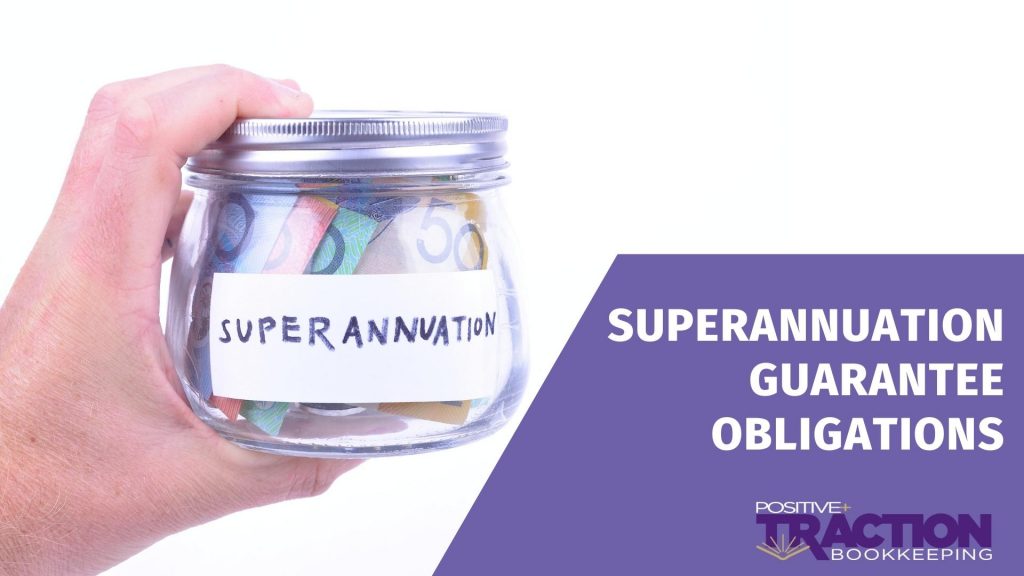SUPERANNUATION GUARANTEE OBLIGATIONS
What are your business obligations to Superannuation?
Superannuation In A nutshell
Simply put, superannuation is money put aside by employers over the working life of an employee with the end purpose being for the employee to live off after retirement. Superannuation Guarantee is a national obligation imposed on employers by the Australian Tax Office (ATO). It is a lawful guarantee by all employers that they will pay 10% (likely to rise as years go on), to all eligible employee’s ordinary wages, into a superannuation fund from a choice of superannuation funds or one specifically nominated by the employee. These payments are commonly referred to as ‘contributions’.
Note: Prior to 1 July 2022 superannuation is payable to all eligible employees if earning $450 or more before tax per calendar month. Currently, after 1 July 2022, this threshold is to be removed and all eligible employees must be paid superannuation regardless of wage earned each calendar month.
Eligibility
All categories of worker may be eligible for superannuation contributions. These include:
- full-time, part-time or casual
- receiving a super pension or annuity while working (this includes employees on transition to retirement)
- a temporary resident, such as a backpacker
- a company director
- a family member working in your business.
Employees Under 18 Years Old
Under 18-year-old employees are eligible for superannuation contributions if they work for you for more than 30 hours per week, or they earn $450 or more before tax in a calendar month.
Contractors
Contractors may be eligible for superannuation contributions if you pay them mainly for their labour, or they earn $450 or more before tax in a calendar month.
You must pay superannuation contributions for contractors if you pay them:
- under a verbal or written contract that is mainly for their labour (more than half the dollar value of the contract is for their labour)
- for their personal labour and skills (payment isn’t dependent on achieving a specified result)
- to perform the contract work (work cannot be delegated to someone else).
Note: You do not pay superannuation contributions to contractors who are from another business you engaged to do work for you.
Superannuation Due Dates & Late Penalties
Payment Schedule
In general, superannuation contributions are made quarterly or on the next available business working day if the due date falls on a weekend or public holiday. These quarterly dates are as follows:
- (1 Jul – 30 Sep) – payment due 28 Oct
- (1 Oct – 31 Dec) – payment due 28 Jan
- (1 Jan – 31 Mar) – payment due 28 Apr
- (1 Apr – 30 Jun) – payment due 28 Jul
You can make contributions more frequently such as monthly but the full amount due must be paid on or by each quarterly due date above.
Note: Some superannuation funds, awards and contracts require more regular contributions than quarterly. You will need to abide by those conditions as well as finalising superannuation contributions on or by each quarterly due date above.
Penalties For Late Payment
If you are late (or pay into the wrong fund) to make superannuation payment(s), penalties and charges will apply. This is called the Superannuation Guarantee Charge (SGC). In this situation, you must lodge a Superannuation Guarantee Charge statement and pay a fee to the ATO which is incidentally, not tax-deductible. The fee will be on top of the employee’s superannuation payment(s) and the ATO will then make the superannuation payment(s) for the employee to bring their fund up to date.
Note: If an employee changes their superannuation fund without notifying their employer, and the employer pays into the now wrong fund, the ATO will still hold the employer responsible, and a Superannuation Guarantee Charge will apply.
Other penalties can apply if you:
- fail or are late to provide an SGC,
- make a false or misleading statement,
- fail or are late to pay an SGC
- other administrative duties.
Record Keeping
You are obligated and advised to keep records pertaining to each employee’s superannuation contributions. These records should be electronically accessible and kept for at least 5 years after the employee has left your employ. These records should include receipts and documents issued by the relevant superannuation fund(s) showing you made the contributions to the fund(s). A record of the choices of fund each employee was given is also advisable.
Setting Up Superannuation Guarantee For Your Business
As an employer, you must have your business set up to pay superannuation. This requires you have the following in place:
- Set up a default superannuation fund
- Provide a choice of several superannuation funds
- Request an employee’s stapled superannuation fund if they do not make a choice of fund voluntarily
- Provide employee’s Tax File Number (TFN) to their funds
- Set up to pay superannuation contributions electronically to the correct fund
How can we help?
At Positive Traction Bookkeeping, we can help you in a variety of ways to set up and manage your superannuation contributions. In short, we can do it all for you or just those tasks you prefer not to do. Positive Traction Bookkeeping can also monitor and lessen the impact of your quarterly contributions by breaking the contributions you pay down to monthly payments so as to spread out the impact on your cash flow. This can be an ongoing, automatic service we provide you each month, or we can simply advise you each month of the upcoming contribution amount and await your approval as to whether to make more frequent contributions at that time or not.
Summary
So then, taking Superannuation Guarantee seriously and paying your employee’s superannuation contributions are very important. You must also keep records of contributions and other documents for each employee’s superannuation.
Positive Traction Bookkeeping can help you with as much or as little help with your Superannuation Guarantee as you require.

